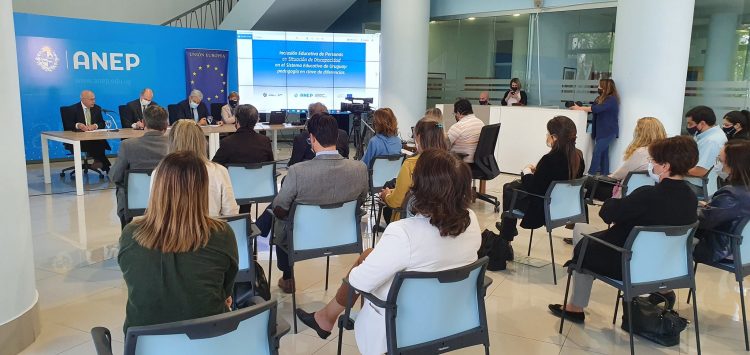ANEP, EUROsociAL+ and AUCI presented a series of inclusive educational materials, prepared within the framework of the project "Educational Inclusion of People with Disabilities in the Educational System of Uruguay: pedagogy based on differences". This contribution constitutes a support tool for teachers in the Uruguayan education system.

Foto: ANEP
Following UNESCO and World Education Agenda 2030 indications, Agenda 2030 SDG 4 (which suggest countries try to review, evaluate and improve in order to remove obstacles in schools) ANEP, with the support of the European Union Programme EUROsociAL+, promotes the initiative “Educational Inclusion of People with Disabilities in the Educational System of Uruguay: pedagogy based on differences”.
This action has contributions from Spain’s ONCE Social Group and from a small number of international experts who have come together to collaborate in designing strategies based on best practices which other European and Latin American countries are carrying out in this respect.
During the presentation, the president of CODICEN, Robert Silva, stated that Uruguay has a rich history in terms of inclusion. In this sense, he stressed that the ANEP Educational Development Plan, whose execution lasts until 2024, “established a clear focus on inclusion and equity policies.”
Silva welcomed the fact that all levels of education participated in preparing the material, within the framework of the support and cooperation provided by EUROsociAL+, “which generates learning, brings to fruition, documents and socialises”.
“Inclusion is not achieved by more materials made, by more documents distributed. Inclusion must take hold within educational communities themselves with a framework of action for all those who form them from a holistic perspective, to promote the personal and emotional development of their members. Keeping in mind also that there can be no exercise of rights if some of their members are excluded”, he stressed.
The executive director of the Uruguayan Agency for International Cooperation, Mariano Berro, stressed that the work with the European Union “comes at a time when we are cooperating and participating at a very high level, in response to the demands that Uruguay has to face”.
“EUROsociAL+ helped us to work on a problem that was visible but for which it was very difficult to find a solution,” he said. Likewise, he highlighted the multiplying effect of the project, since “it leaves us human skills that remain in the institution to transfer at the national level, but above all at the regional level. We are committed to sharing the knowledge that we are acquiring”.
For his part, the ambassador of the European Union in Uruguay, Paolo Berizzi, reflected on the fact that in many countries inclusive education continues to be considered from the perspective that students with disabilities “simply must receive education in common or specific environments. At the international level, inclusive education is conceived according to a holistic approach, where the entire community around the boy and girl – specifically with disabilities – must play an active role in the inclusion. That is to say, the class, the school, the family and the teachers”.
“This enhancement of diversity is an approach that is based on the conviction that education is a human right, that it is the basis for building a more just society, and that inclusion is a responsibility that falls to us all”, he asserted.
Access the Video of the Presentation



